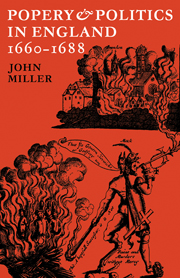Book contents
- Frontmatter
- Contents
- Preface
- Abbreviations
- Note on spellings and dates
- Introduction
- 1 The Catholic laity
- 2 England and Rome: the Catholic clergy
- 3 The penal laws and their enforcement
- 4 The development of the anti-Catholic tradition
- 5 The Restoration settlement and after
- 6 The French alliance and ‘Catholicity’
- 7 York and Danby
- 8 The Popish Plot and the Exclusion Crisis
- 9 The Tory reaction
- 10 James II and the Church of England Men
- 11 James II and the Dissenters
- 12 James II and Rome
- 13 The missionary effort under James II
- 14 The opposition to James II
- Appendices
- Select Bibliography
- Index
10 - James II and the Church of England Men
Published online by Cambridge University Press: 07 October 2011
- Frontmatter
- Contents
- Preface
- Abbreviations
- Note on spellings and dates
- Introduction
- 1 The Catholic laity
- 2 England and Rome: the Catholic clergy
- 3 The penal laws and their enforcement
- 4 The development of the anti-Catholic tradition
- 5 The Restoration settlement and after
- 6 The French alliance and ‘Catholicity’
- 7 York and Danby
- 8 The Popish Plot and the Exclusion Crisis
- 9 The Tory reaction
- 10 James II and the Church of England Men
- 11 James II and the Dissenters
- 12 James II and Rome
- 13 The missionary effort under James II
- 14 The opposition to James II
- Appendices
- Select Bibliography
- Index
Summary
JAMES'S MOTIVES AND PROBLEMS
James II ranks ajs one of the great villains of Whig historiography, the English equivalent of Louis XIV. According to most of his contemporaries and most subsequent historians, James tried during his reign to destroy English liberties and the Common Law, to establish a military despotism, to impose Catholicism and to subject England to the pope. Even when the naked anti-Catholicism of the seventeenth century became less respectable, the Whig and liberal historians of the nineteenth century still stressed each act of illegality and each violation of the letter of the law as the Whigs understood it; thus Macaulay even quibbled with the strict legality of the brutal sentence imposed on Titus Oates in 1685 for his monstrous perjuries. There has been a tendency to see the establishment of absolutism as James's primary concern and to regard his conversion to Catholicism as something of secondary importance. The implicit anti-Catholicism which has remained a central feature of the Whig interpretation of history has led historians to assume that no rational man could possibly be convinced of the truth of Catholicism, since Catholicism, in their eyes, depended for its survival on ignorance, superstition and the denial of rational inquiry. Considered in this frame of mind, it appeared that James's conversion must have been both superficial and sinister, merely the religious corollary of his alleged desire to establish a political despotism. One finds echoes of this attitude even in the work of perceptive modern historians who have otherwise dealt harshly with the Whig interpretation of this period.
- Type
- Chapter
- Information
- Popery and Politics in England 1660–1688 , pp. 196 - 213Publisher: Cambridge University PressPrint publication year: 1973



